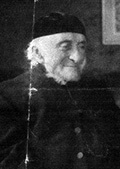the Second Sunday of Lent
Click here to join the effort!
Bible Dictionaries
Fausset's Bible Dictionary
Browse by letter: A

Andrew R. Fausset
Welcome to the 'Fausset's Bible Dictionary', one of the dictionaries resources FREELY available on StudyLight.org!
Containing 4,001 entries cross-referenced and cross-linked to other resources on StudyLight.org, this resource can be classified as a required reference book for any good study library.
From the co-author of the classic Jamieson, Fausset and Brown Commentary, Fausset's Bible Dictionary stands as one of the best single-volume Bible encyclopedias ever written for general use. The author's writing style is always clear and concise, and he tackles issues important to the average student of the Bible, not just the Biblical scholars. This makes Fausset an excellent tool for both everyday Bible study and in-depth lesson or sermon preparation.
All scripture references and reference to other entries within the text have been linked. To use this resource to it's full potential, follow all the links presented within the text of the entry you are reading.
If you find a link that doesn't work correctly, please use our convenient contact form. Please tell us the reference work title, entry title and/or number (this can be found in the address line), and a brief description of the error found. We will review and make corrections where needed.
You can also use this form if you have any suggestions about how to improve the usability of this resource.
These files are public domain.